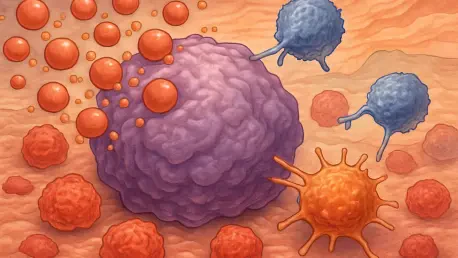
A significant portion of cancer patients do not respond to immunotherapy because their tumors are immunologically inactive, but a groundbreaking collaborative study from Cornell University researchers has unveiled a remarkable solution using ultrasmall fluorescent silica nanoparticles, known as

A groundbreaking therapy capable of halting one of the most aggressive forms of cancer has long been shadowed by a side effect so severe that it forces patients to abandon their best hope for survival. This paradox has defined the initial chapter of PSMA-targeted radioligand therapy, a significant

A groundbreaking study from Brazil has provided compelling evidence that a simple blood test could revolutionize the diagnosis and treatment of lung cancer, offering a much faster and less invasive alternative to traditional methods. Research centered at the national oncology reference center,

In the quiet intensity of an operating room, a surgeon's judgment is paramount, yet distinguishing the exact border between cancerous and healthy thyroid tissue has long remained a perilous blend of skill, experience, and educated guesswork. This critical moment, where a scalpel’s path is decided

The holy grail of oncology has always been to catch cancer when it is most treatable—at its earliest, most nascent stages. For years, this has been an incredible challenge, but we're now at a thrilling inflection point where artificial intelligence is meeting molecular biology to create solutions

Pancreatic cancer has long maintained a daunting reputation as one of the most aggressive and difficult-to-treat malignancies, a challenge largely defined by its resistance to standardized therapies and the limitations of conventional research models. For patients and clinicians alike, the path of